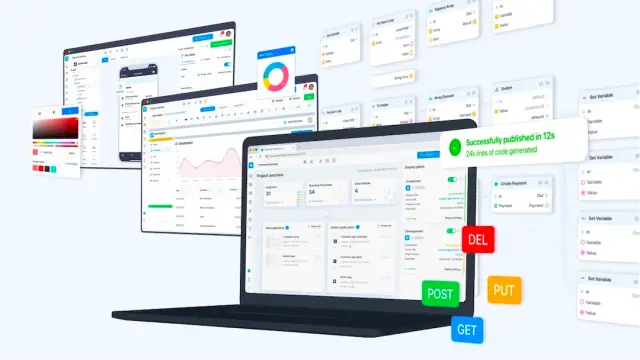Understanding the ROI of a Custom CRM
Explore the return on investment (ROI) from implementing a custom CRM solution. Learn about its advantages, cost analysis, and implementation process, empowering businesses with robust, streamlined operations.

Why Businesses Should Consider a Custom CRM Solution
In today's highly competitive market, businesses need to continuously adapt to the rapidly changing environment and customers' ever-evolving needs and expectations. A key factor determining the success of a business is its ability to enhance its customer relationship management (CRM) capabilities, ultimately enabling the organization to better serve its customers and secure a competitive edge.
A CRM solution is essential in organizing, managing, and tracking all customer interactions and their related data across all touchpoints. While many companies rely on off-the-shelf CRM software, an increasing number of organizations are now realizing the benefits of investing in custom CRM solutions tailored to their specific business requirements and goals.
Custom CRM solutions provide a flexible, adaptable, and integrated approach to customer relationship management that supports the unique needs of a business. Custom-made CRMs enable organizations to efficiently manage customer data and interactions while also seamlessly integrating with existing systems and processes, which in turn, helps businesses maintain a competitive edge in the market.
Custom CRM vs. Off-the-shelf CRM: Features and Flexibility
When deciding whether to invest in a custom CRM solution or an off-the-shelf CRM software, businesses should carefully consider the differences between the two to determine which option will best meet their specific needs.
Customization and Flexibility
A custom CRM solution offers greater customization and flexibility, as it is specifically designed to cater to a company's unique needs. Unlike off-the-shelf CRM software, a custom CRM system can easily be adapted to support a business's changing requirements without requiring significant modifications or the involvement of external developers.
Feature Set
Off-the-shelf CRM solutions often come with predefined features and functions that may not always meet an organization's requirements. On the other hand, a custom CRM solution can be designed to include all the necessary features, tailored to the organization's specific processes and workflows.
Integration
Custom CRM solutions can be easily integrated with existing business systems and applications, ensuring a seamless flow of data and improved operational efficiency. In contrast, off-the-shelf CRM software may require additional customization and integration work for it to operate effectively alongside pre-existing systems.
Scalability
As a business grows and evolves, its CRM needs will also change. Custom CRM solutions provide better scalability compared to off-the-shelf CRM software, as they can be easily modified and expanded to accommodate growth.
Advantages of Custom CRM: Key Benefits and Features
By choosing to invest in a custom CRM solution, businesses can reap several benefits that may not be provided by standard off-the-shelf CRM software packages. Some of the key advantages of custom CRM systems include:
- Enhanced Productivity: Custom CRM solutions provide features and functionalities specifically designed to streamline an organization's workflows and processes. This allows businesses to automate repetitive tasks, enabling employees to focus on more value-added activities and boosting overall productivity.
- Improved Customer Satisfaction and Retention: Custom CRM solutions are designed to provide businesses with a comprehensive understanding of their customers. By offering features tailored to identifying and addressing customer needs, these systems enable organizations to provide personalized and timely service, ultimately leading to increased customer satisfaction and retention rates.
- Streamlined Sales and Marketing Processes: By integrating sales and marketing data within a single centralized system, custom CRM solutions allow businesses to better align their marketing and sales efforts. This ensures that sales teams have access to accurate and up-to-date information, ultimately resulting in a smoother sales process and better collaboration between functions.
- Enhanced Communication and Collaboration: A custom CRM solution can facilitate improved communication and collaboration across departments, ensuring that all employees have access to relevant customer information. This allows businesses to address customer inquiries and issues more effectively, resulting in faster resolutions and better customer experiences.
- Scalability: One of the most significant advantages of a custom CRM solution is its ability to scale with a business's growth. This means that organizations can modify their CRM system as needed without having to invest in a completely new solution, ensuring that they can adapt to changes in the market and customer expectations.

By considering these factors, businesses can better understand the value of a custom CRM solution and how it can help them surpass their competitors in customer relationship management.
Calculating the ROI: Factors to Take into Account
Measuring the return on investment (ROI) of a custom CRM solution requires considering a variety of factors that contribute to both the tangible and intangible benefits it brings to your organization. Here are some of the key factors to take into account when calculating the ROI of custom CRM implementation:
- Development costs: This includes the initial expenses involved in designing and developing the custom CRM solution from scratch, which can vary depending on the complexity and specific requirements of the project.
- Software and hardware requirements: Depending on the architecture and infrastructure of your custom CRM system, you may need to invest in new hardware resources or software licenses to support its smooth operation.
- Support and maintenance costs: Once your custom CRM is up and running, you need to consider ongoing costs associated with its support, bug fixes, and updates to ensure optimal performance and security over time.
- Training expenses: Adequate training for employees using the CRM system is crucial to maximize its benefits. Therefore, it's essential to factor in training costs, which can range from instructor-led sessions to online e-learning programs.
- Improved productivity: One of the main benefits of CRM implementation is the increase in productivity it brings to sales, marketing, and customer service teams. Calculating the financial impact of this improved efficiency will help demonstrate its value to your organization.
- Customer satisfaction and retention: A well-tailored CRM solution is designed to enhance customer interactions, leading to higher satisfaction and retention rates. Estimating the value of increased customer loyalty and repeat business will add another dimension to your ROI calculation.
Considering all these factors can give you a comprehensive understanding of the potential ROI of a custom CRM solution, enabling you to make informed decisions throughout its development and implementation stages.
Estimating the Costs of Custom CRM Development
Development costs are a significant factor in the ROI calculation of a custom CRM. To estimate this expense, it's important to consider the various components that contribute to CRM development, such as:
- Planning and analysis: This stage involves researching and defining your CRM requirements, creating a project plan, and allocating necessary resources. Costs in this phase typically include consultancy fees, research hours, and project management expenses.
- Design and development: The actual CRM design and development process can be highly variable in terms of complexity, the number of features, and integration requirements. Development costs may include hiring software engineers, UX/UI designers, and testing specialists, depending on the expertise of your in-house team.
- Integration and deployment: Integrating your custom CRM solution with existing systems, such as email, databases, and ERP software, adds to development costs. Additionally, deploying the system on either on-premises equipment or cloud platforms can further contribute to expenses.
- Customization and scaling: Depending on the adaptability of your custom CRM, you may want to add or modify features over time as your business evolves. Estimating the costs of future customization and scaling helps ensure you're prepared for long-term CRM investment.
By assessing these components, you can gain a realistic estimate of custom CRM development costs and how they'll affect your ROI calculations.
Improving ROI with AppMaster No-Code Platform
AppMaster's no-code platform offers a cost-effective way to develop custom CRM solutions while accelerating the development process. By leveraging the benefits of this powerful platform, businesses can significantly improve their ROI in the following ways:
- Reduced development time: The AppMasterno-code platform allows you to create backend, web, and mobile applications without extensive coding expertise. This accelerates the development process and helps you bring your custom CRM solution to fruition faster, ultimately reducing your time to market and associated costs.
- Lower development costs: AppMaster's easy-to-use, drag-and-drop interface enables citizen developers and professionals alike to create custom CRM solutions, thereby reducing the need for expensive software development resources. This consequently lowers the overall development costs, enhancing the ROI of your CRM implementation.
- Scalability and flexibility: AppMaster's no-code platform empowers businesses to rapidly adapt to changing requirements and scale their CRM solutions as needed. This flexibility provides a solid foundation for long-term growth, ensuring the custom CRM remains valuable and relevant over time.
- Integration capabilities: Custom CRM solutions built on the AppMaster platform can seamlessly integrate with a wide variety of databases, systems, and third-party services. This integration capacity simplifies and speeds up CRM implementation, thereby cutting down on deployment costs and enhancing ROI.

Implementing a custom CRM solution using the AppMaster no-code platform can significantly improve the return on investment for your organization by decreasing development costs, reducing time to market, and offering scalability and seamless integration options.
Implementing a Custom CRM Successfully: Best Practices
Developing and deploying a custom CRM solution requires careful planning, ongoing monitoring, and adaptation to derive the maximum benefits. Here are some best practices to ensure the successful implementation of a custom CRM solution:
Set Clear Objectives and Key Performance Indicators (KPIs)
Before implementing a custom CRM solution, it is crucial to define the objectives and desired outcomes. Having a clear understanding of the reasons for the enhanced CRM system helps to establish a solid foundation for the implementation process. Additionally, define relevant KPIs to measure the performance of the solution and ensure it meets the expected goals.
Involve End-Users in the Development Process
Incorporate the opinions and requirements of end-users, such as sales, marketing, and customer support teams, into the development process. This collaboration enables developers to understand the actual needs and preferences of the users, leading to a more tailored and efficient CRM solution.
Ensure Seamless Integration with Existing Systems
A successful custom CRM implementation should integrate smoothly with the organization's existing systems and software applications. This eliminates data silos, streamlines workflows, and boosts productivity. Consider APIs or middleware solutions when necessary to facilitate seamless communication between the custom CRM and other tools.
Provide Comprehensive Training and Support
Train users thoroughly on the custom CRM solution to minimize any disruptions during the transition and maximize adoption. Provide ongoing support, such as help documentation, tutorials, and knowledgeable staff, to ensure effective use of the system.
Monitor and Optimize the System Regularly
A custom CRM solution must adapt to the changing needs of the business. Regularly monitor and analyze the performance of the CRM system to identify potential improvements and areas requiring optimization. Gather feedback from end-users and respond to their concerns or suggestions to maximize effectiveness.
Plan for Scalability and Flexibility
As the business grows, the CRM solution must adapt to new processes, accommodate a larger volume of data, and integrate with additional systems. When developing the custom CRM, ensure that it is built on a flexible and scalable foundation to facilitate these changes with minimal disruption.
An example of a platform that enables custom CRM creation and ensures scalability is the AppMaster no-code platform. By using AppMaster, businesses can create, modify, and deploy custom CRM solutions that meet their unique needs without coding expertise. In addition, AppMaster allows organizations to enjoy faster turnaround times and cost savings during the development process compared to traditional methods.
Implementing a custom CRM solution successfully requires a combination of clear objectives, user involvement, seamless integration, thorough training, continuous monitoring, and planning for scalability. With these best practices in place, businesses can maximize the return on investment (ROI) from their custom CRM and enjoy the benefits of streamlined operations, improved customer satisfaction, and overall business growth.
FAQ
A custom CRM solution is a customer relationship management system specifically designed to meet the unique requirements of an organization. It offers tailored features, flexibility, and seamless integration with existing systems.
To calculate the ROI of a custom CRM solution, consider factors like development costs, software and hardware requirements, support and maintenance costs, training expenses, and the financial impact of improved productivity and customer satisfaction.
A custom CRM solution offers tailored features and functionality designed specifically for a business, whereas off-the-shelf CRM software comes with predefined features that may not cater to unique business requirements. Custom CRM provides greater flexibility, seamless integration, and scalability compared to a pre-built solution.
The benefits of custom CRM solutions include enhanced productivity, higher customer satisfaction and retention rates, streamlined sales and marketing processes, improved communication and collaboration, and scalability to accommodate business growth.
AppMaster's no-code platform empowers users to develop custom CRM solutions without coding expertise. This enables businesses to create tailored CRM systems to meet their specific needs, streamline operations, and improve customer satisfaction with a faster turnaround than traditional development methods.
Best practices for implementing a custom CRM solution include setting clear objectives and KPIs, involving end-users in the development process, ensuring seamless integration with existing systems, providing comprehensive training, and continuously monitoring and optimizing the system according to users' feedback.





